Eurozone refuses Greek bailout extension
THE next three weeks are critical for Greece, after it failed to meet the deadline to repay its $2.2 billion debt. Here’s all you need to know about the crisis.
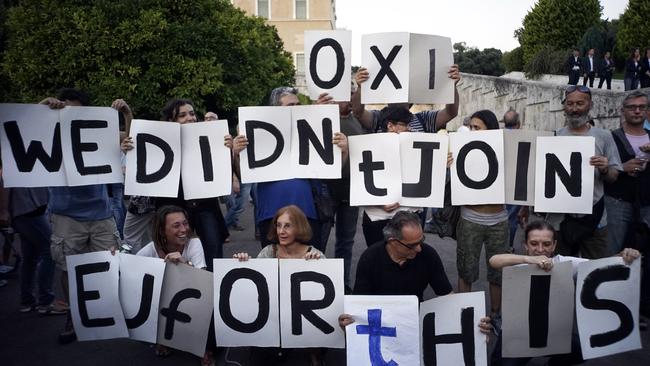
Greece’s international bailout has expired
It defaulted on $A2.2 billion debt IMF repayment
It’s now the first developed country to fall into arrears
Eurozone ministers rejected last-minute extension plea
GREECE slipped deeper into its financial abyss after the bailout program it has relied on for five years expired and the country failed to repay a loan due to the International Monetary Fund.
With its failure to repay the roughly $A2.2 billion to the IMF, Greece became the first developed country to fall into arrears on payments to the fund. The last country to do so was Zimbabwe in 2001.
The Greek government submitted a proposal for a two-year rescue program from the eurozone bailout fund to cover its financing needs and restructure its debt.
According to the proposal, Greece wants the new rescue package to help pay for EUR29.15 billion in debt repayments between 2015 and 2017.
The proposal, signed by Prime Minister Alexis Tsipras, also asked for an extension of the existing EUR245 billion rescue program.
But eurozone finance ministers decided in a teleconference late last night that there was no way they could reach a deal before the deadline.
“It would be crazy to extend the program,” said Dutch Finance Minister Jeroen Dijsselbleom, who heads the eurozone finance ministers’ body known as the eurogroup.
Germany will demand that Greek PM Alexis Tsipras and Finance Minister Yanis Varoufakis resign as a condition for any new eurozone bailout loans, The Times reports.
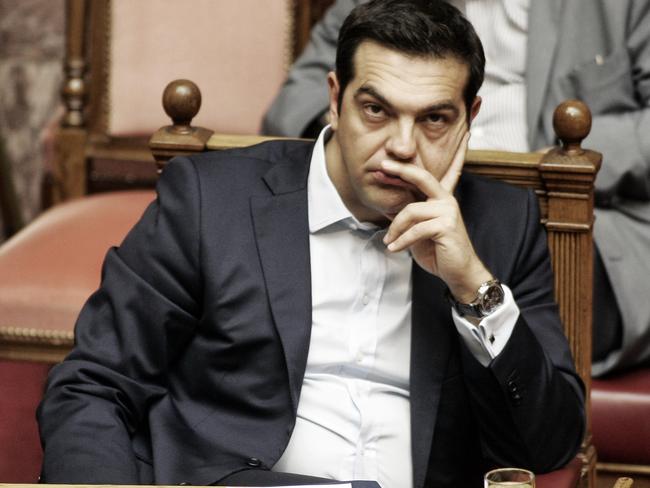
Whether Mr Tsipras and Mr Varoufakis resign or not, missing the IMF payment will cut Greece off from new loans from the organisation.
And with its bailout program expiring, Greece will lose access to financial support it has not yet tapped. Already, Greek banks have been shut down until July 6, many ATMs have dried up and bank withdrawals have been limited to $AU86 a day.
The next three weeks are crucial for Greece, as the country must repay a bond to the European Central Bank (ECB) on July 20.
Q: Will the default on a payment to the IMF affect Greece’s economy?
A: The expiration of the existing bailout and default on IMF payments aren’t expected to have immediate consequences for Greece’s economy. Its banks remain closed until July 6 after the European Central Bank capped the amount of emergency liquidity support. Cash withdrawals by Greeks have been limited to $A86 a day for each account-holder since Monday.
Yesterday’s developments create uncertainty over how Athens will be able to pay other creditors, including the ECB in July, and heighten anxiety over its survival in the euro.
Q: Will the default affect Greece’s European Central Bank loan?
A: Expiration of Greece’s bailout program could change the ECB’s view on its emergency lifeline to Greek banks. Their banks have relied on emergency lending from the central bank for months. On Sunday, the ECB froze the emergency lifeline at around 89 billion euros. Unable to get more cash to give to depositors, banks shut down. To reopen the banks, that lifeline needs to be turned back on.
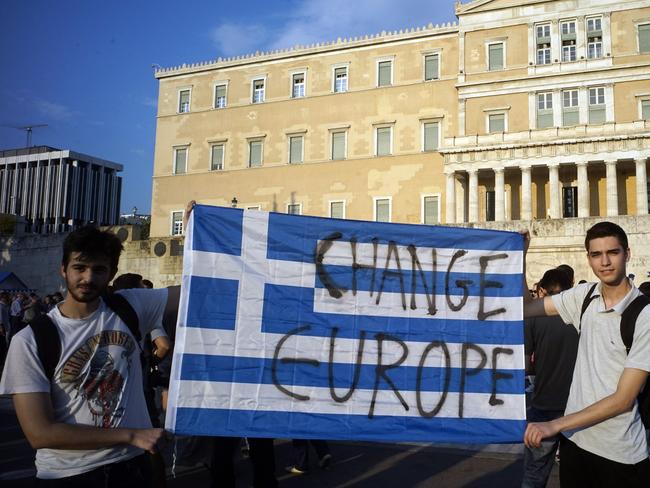
Q: Could the European Central Bank cut off its lifeline to Greece?
A: It is possible. The lifeline, known as Emergency Liquidity Assistance, or ELA, is flexible. Banks receiving it must be “solvent”. The ECB also doesn’t lend money for free. Greek banks must post assets as collateral to get ELA. Insolvency of Greece’s banks, or a determination that the collateral they are posting isn’t adequate could end the ECB’s lifeline.
Q: Why is July 20 so important?
A: Greece owes the ECB 3.5 billion euros in Greek-government bonds held by the central bank. If Greece doesn’t pay, the ECB may not keep providing ELA to the troubled country.
Q: What happens if Emergency Liquidity Assistance is cut off?
A: The banks collapse when ELA loans are due as the banks cannot repay them. So the collateral they posted would be seized by the bank.
Q: What do Greeks think?
A: The default on Greece’s IMF payment and the bailout program have sparked protests around the country. 20,000 pro-bailout supporters took to the streets of Athens, a day after a large rally backing Tsipras’s “no” stance on Monday. Protesters carried banners featuring slogans such as “Greece is Europe” while the cry “resign” went up from the crowd repeatedly.
Lawyer Vassiliki Salaka said those in charge of Greece now were “incompetent, they lack organisation, they don’t know what they want.”
But many other Greeks also back the government’s defiant stance against the country’s creditors since it was elected in January, blaming creditors for forcing Greece into years of painful recession by demanding tough austerity cuts. Pro-Greece demos were set to take place this week in Berlin, Paris, Brussels, Rome and Amsterdam.
Q: What happens next?
A: Prime Minister Alexis Tsipras has called a referendum for Sunday. Greeks will be asked to vote if they support a bailout deal that creditors have proposed that involves budget cutbacks and tax increases in exchange for the remaining loans in the country’s rescue program.
Tsipras is urging people to vote “no.” The catch, however, is that by the time of the vote, Greece’s bailout program would have run out. So the Greeks would be voting on an offer that has technically expired. A “no” vote could mean euro exit is closer for Greece, as the country would have no outside financial aid. Some think a “yes” could restart talks. Joerg Kraemer, chief economist at Commerzbank, says that “should the electorate vote in favor of a compromise, the eurozone members will not be able to ignore that and will resume negotiations.”
A “yes” vote, however, could lead to the collapse of the Greek government, as it is unclear it would be able or willing to implement a deal with creditors that it had so vehemently resisted.
Q: Is a deal to save Greece still possible?
A: Technically, yes. EU economic official Pierre Moscovici said Monday that a deal was “a few centimetres” away.
EU officials and creditors indicate they are still willing to strike a deal. Tsipras, however, has dismissed all their proposals so far as insufficient.
Q: Will Greece leave the eurozone?
A: Many see Greece’s decision to close the banks as a step closer to leaving the euro.
The banks’ trouble is a bad sign, because the Greek government would need billions of euros if it has to rescue them without outside support. A modern economy needs functioning banks. For Greece that would mean printing a new currency and using it to refloat the banking system.
Greece is also having serious trouble paying its day-to-day bills for salaries and pension.
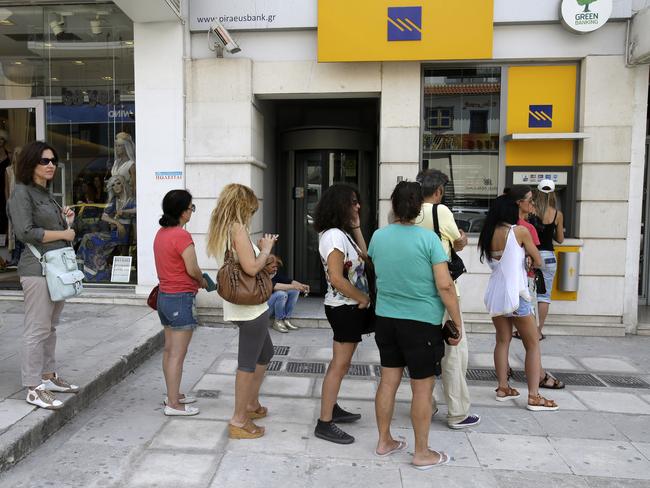
Q: If Greece leaves the euro, will the shared currency fall apart?
A: Many economists say no. Since its troubles over high government debt started in 2009 - in Greece - the eurozone has built anti-crisis measures. Those include a pot of money to rescue troubled governments and an offer by the ECB to buy the bonds of governments facing market pressure. The ECB’s current 1.1 trillion Euro bond-buying monetary stimulus program has further insulated markets from panic. The ECB says it will take additional steps if necessary to keep Greece’s troubles from spreading. In the longer term, however, some experts think a Greek departure sets a bad precedent. Investors might think other countries could leave, and would require higher interest to lend those countries money. That would hurt the countries financially, in the longer term, and market pressure could conceivable force them out too if they run into trouble.
Q: How has the fallout in Greece affected Australia’s economy?
A: More than $35bn was wiped off the Australian stock market in the first hour of trading on Monday as investors brace for an increasingly likely Greek exit from the euro zone. Today, Australian 10-year bond prices are weaker, tracking moves in US Treasuries as the Greek debt crisis deepens, and after comments from the US Federal Reserve. Reserve Bank governor Glenn Stevens said today that Australia’s exposure to the Greek crisis was “miniscule directly” in a speech in London. “So I would anticipate that there’s unlikely to be material issues for us unless there was a major ruction in global markets, and in that world everybody’s affected, Mr Stevens said.
Q: What does it mean for you and me?
A: There is likely to be heightened volatility in investment markets, which is where 60-75 per cent of most Australians’ superannuation is parked. Recent falls cut about 2 percentage points off the typical “balanced” fund in June.
If things get a lot uglier, the Reserve Bank of Australia could consider cutting official interest rates. That’s good for households that have more debts than savings but bad for retirees relying on interest for income. On the lighter side, a holiday in Greece could become very cheap. That’s what happened in Argentina after its economy went bust in 2002. While most visitors were scared off by its economic crisis, this reporter was among those who took advantage of its currency valuation and had a holiday that would have been unaffordable previously.
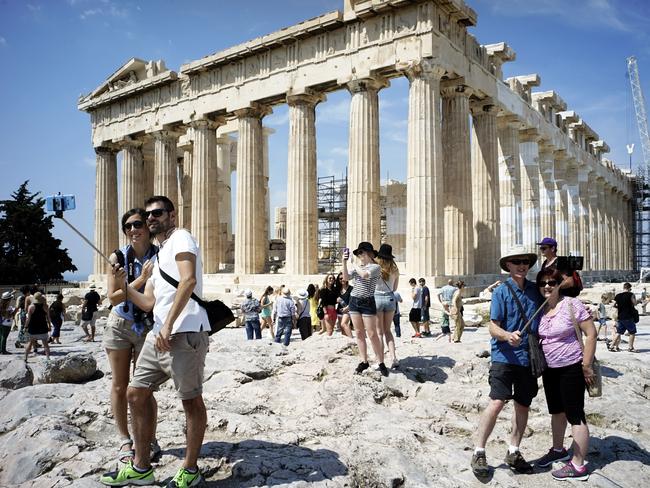
Q: What advice have tourists been given on visiting Greece?
A: There are no warnings against holidaying in Greece, but tourists have been advised to take with them all the cash they would need for their trip, plus extra for emergencies. This should include the possibility that they may need to extend their stay should there be any disruption in the country. Travel firms such as Thomas Cook were also calling on customers to do the same.
Foreign Minister Julie Bishop told Australians travelling to Greece to take the plastic.
“(Take) credit cards, debit cards, cash because there could be some circumstances where money and payment systems run short or are going to be under a great deal of pressure,” she said.
The Greek banks are shut all week, and though withdrawals from cash machines have been capped, this applies only to locals not foreigners. Tourists are advised that there are queues for cash machines and some may close or run out of money, and credit cards could also be refused in some places. There are also regular strikes, which can affect public transport. And demonstrations often take place in central Athens, particularly in Syntagma Square. Travellers are warned to avoid large crowds and protests. On Sunday, there will be a vote on the latest debt deal, and, depending on the outcome, there could be several more demonstrations.



